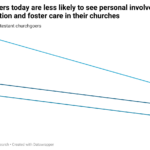
What matters most in pastoral ministry is not your platform or your likeness to the cool pastor down the road but your likeness to Christ.
By Andrew Hébert
In his book The Imperfect Pastor, Zack Eswine describes how the realization of what it means to be a pastor—the hard, gritty, patient work required of shepherding real people through messy problems amid the brokenness of life—changed his false perception of what ministry would be like:
I didn’t envision this kind of daily life. I thought of a pastor as something akin to an itinerant conference speaker, prophetically originating and preaching vision for large crowds and organizations, so that I can constantly demonstrate that we are not like other churches, and I am not like other preachers. Weekly, I would mobilize and manage programs, hiring, firing, and training personnel, so that by the force of my personality, the expertise of my organizational leadership, and the savvy uniqueness of our brand presence, I (I mean we, of course) can build a more notable gospel platform from which I (uh, I mean, we) can rise into greater gospel prominence, and then I (I don’t mean we) can leave and move on to bigger and better gospel things for God.
The expectations he’s describing are, of course, those of a “celebrity pastor.” The celebrity pastor mindset—what Eswine elsewhere calls the desire to do “large things famously” as fast as possible—has pervaded the culture of American evangelicalism. The way some pastors describe themselves reinforces what has become normal in American churches: pastors are visionaries, catalysts, thought leaders, social media influencers, motivational speakers, and change agents.
The desire to be known, to be popular, to be successful, to be cool, and to be adored is ingrained deeply in the human heart, including in the hearts of pastors. — @andrewhebert86 Click To TweetPastors work to expand their platform, broaden their reach, and leverage their brand. The desire to be known, to be popular, to be successful, to be cool, and to be adored is ingrained deeply in the human heart, including in the hearts of pastors.
The celebrity lure
For many pastors, the temptation to idolize prominence and success has always been there but has intensified during the pandemic. Pastors have watched members leave their churches during the pandemic to join the megachurch down the road that has a more engaging pastor, better music, more flashy stage set-up, or fill-in-the-blank. It’s tempting to want to compete by mimicking whatever the successful pastor down the road is doing.
Pastors can be jealous of the celebrity pastors who write best-selling books, are invited to preach at conferences, and need 12 multi-site locations and 34 weekend services to accommodate the number of people who want to hear them speak.
What matters most in pastoral ministry is not your likeness to the cool pastor down the road but your likeness to Christ. — @andrewhebert86 Click To TweetBut here’s the deal: celebrity pastor culture is crushing. You can’t keep up with the celebrity pastor down the road. What’s more, Jesus never intended for you to do that. No pastor should make it their goal to be a celebrity pastor. What matters most in pastoral ministry is not your likeness to the cool pastor down the road but your likeness to Christ.
Christlike character
This realization is freeing because it releases you from the pressure of living under the burden of comparison. You don’t have to live under the burden of celebrity. You don’t have to live under the burden of being cool and having the most attractive ministry in town. Instead, what matters is your Christlikeness. What matters is your character.
Jesus taught his disciples Christlike character in the beatitudes of the Sermon on the Mount. Before the Sermon on the Mount was given to us, it was given to the men who would lead the early church and ignite the explosive growth of Christianity. If Jesus ever had a leadership manual, the Sermon on the Mount is it.
Notably, Jesus never taught the disciples how to preach better sermons or how to attract large crowds. Instead, he taught them how to follow. — @andrewhebert86 Click To TweetWhat’s striking is what you do and don’t find in the sermon. Notably, Jesus never taught the disciples how to preach better sermons or how to attract large crowds. Instead, he taught them how to follow. He taught them how to pray. He taught them how to love. He taught them how to forgive. He said that you are blessed when you are poor, when you mourn, when you are humble, when you hunger for righteousness, when you are merciful, when you are pure, when you are a peacemaker and when you endure persecution (Matthew 5:3-12).
In other words, you’re blessed—not when you’re cool or celebrated—but when you’re Christlike in character.
What makes a real difference in ministry isn’t our charm, charisma, or leadership capacity. Rather, it’s our humility, brokenness, mercy, and hunger for righteousness. What matters most is not how many social media followers we can get but what kinds of disciples of Jesus we are. What matters most is our character.
A higher calling
Relax, pastor. You don’t have to be cool to be a good pastor. The expectations are much higher than that. You are called to exhibit nothing less than the righteousness of the kingdom through the power of the Spirit. Christlike character is the one thing without which your ministry cannot be successful.
What makes a real difference in ministry isn’t our charm, charisma, or leadership capacity. Rather, it’s our humility, brokenness, mercy, and hunger for righteousness. — @andrewhebert86 Click To TweetIf you are a great preacher, an in-demand conference speaker, or a best-selling author but lack character, you’re missing the most essential element of pastoral ministry. On the other hand, if you’re an “average” preacher, not the most gifted leader, and your ministry is conducted in total obscurity but your character is shaped and formed by Christ and you strive to represent him well, you will have succeeded in that which matters most.

Andrew Hébert
Andrew is the lead pastor of Mobberly Baptist Church in Longview, Texas, and the author of the book Shepherding Like Jesus: Returning to the Wild Idea that Characters Matters in Ministry. He is a graduate of Criswell College and The Southern Baptist Theological Seminary. He and his wife Amy have four children.











